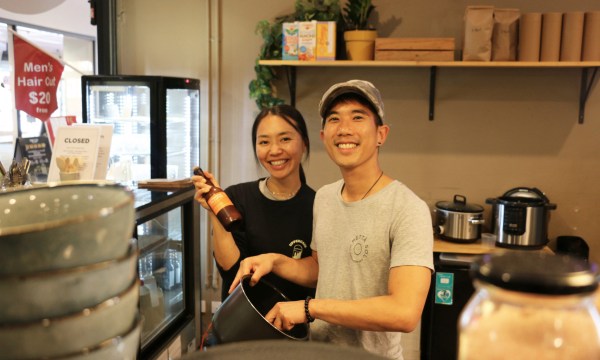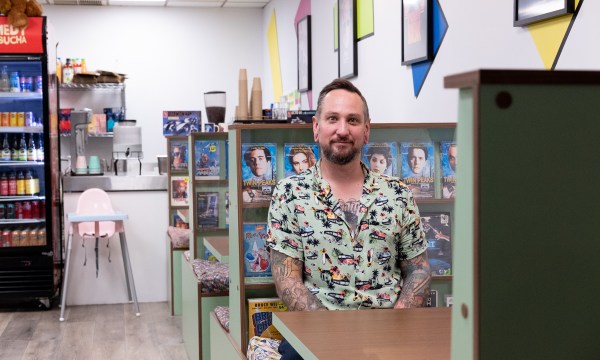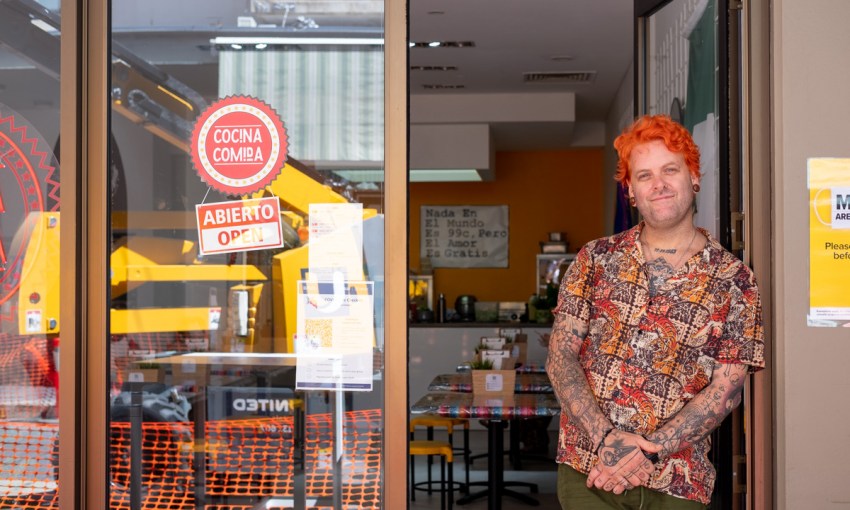Adelaide has lost six high-profile plant-based outfits and eateries since 2020, with one proprietor telling CityMag a combination of inflation and veganism merging with the mainstream has led to a “mega-storm” that’s causing the closures – and he expects more of the “thinning of the herd” to come.
Adelaide’s changing vegan scene
For two years, Reuben Williamson served chicken and chorizo seitan burritos and jackfruit al pastor pork tacos to the hungry East End hoards from his vegan Mexican restaurant Cocina Comida.
Then in March this year, he announced he would close the Ebenezer Lane eatery, telling CityMag at the time, “In the last five weeks, five vegan businesses have shut down. Everyone’s watching it happen and nobody’s going out and supporting them or doing anything about it.”
A month before, the well-known vegan Semaphore brunch spot CRUX – made famous on TikTok for their ooey gooey egg-popping videos – announced that after five years of trade, they too were shuttering.
Then in May, Cindy Nguyen and David Nguyen, co-owners of the popular five-year-old plant-based Vietnamese brunch spot Mettā Sol in Goodwood, served their last tofu-stuffed banh mis and rice noodle-topped gluten-free phos.

Cindy Nguyen and David Nguyen
The entirely-vegan business was sold to a new owner, Cristhian Camilo Correa Ortiz, who told Glamadelaide he wanted to peddle traditional South American fare at the corner spot, which would have a new menu featuring meat dishes such as paninis.
Also that month, the 2006-founded stalwart yum cha joint Zenhouse Vegetarian Fusion reportedly closed its Rundle Street doors, according to Happy Cow, the vegan restaurant bible. (You can still sip on a herbal tea or snag a tofu satay stick from its West Hindmarsh location, though).
The business that kicked off these high-profile shutterings in the city’s non-carnivorous culinary scene was the eight-year-old vegan retail operation Everything Vegan. The business owner Kym Henley told us in January 2020 that she was saying sayonara to her business that month.
Kym presciently told CityMag at the time that as veganism was gaining steam, and as plant-based options were being increasingly stocked at supermarkets such as Coles and Woolies, her niche retail operation was no longer financially viable.
“The old stigma of being a vegan was being a hippie, being a tree-lover, a freak, but that’s changing,” Kym said three years ago.
But the vegan scene was in for another battering – one of the most deadly blows yet.
Eight months later, Robin Eastwood, the owner of the city’s then-oldest plant-based institution, the infamous 32-year-old Vego and Loven It, announced he too was calling time on his Rundle Street restaurant.
Robin told CityMag he was willing to sell the restaurant, which famously rebuffed a reservation request from the Dalai Lama, to the right buyer. And Tim Salmon, the owner of another cult-favourite vegan eatery, the then-Forrest Ville bakehouse Cherry Darlings, stepped up to the plate.
Tim told us he was going to purchase the business because “(Vego’s) was something so important that I needed to make sure it stayed open.”
But this outpost, like all of the others in this story, closed. The upstairs bricks-and-mortar lease was taken over by a specialty teahouse lounge.

Tim Salmon, who started cult-favourite vegan eatery, the then-Forrest Ville bakehouse Cherry Darlings.
This left Tim to run his brand-spanking new vegan Richmond Road location for Cherry Darling’s – an iconic plant-based bakehouse selling pies, pasties, cakes, doughnuts and more. The eight-year-old Cherry’s was located in the suburb of Forestville before making the move.
Last month, however – in the final nail in the coffin of Adelaide’s once-popping meat- and dairy-free scene – Tim broke the news to CityMag that it was the end of Cherry’s with him at the helm.
He tells us now that it will probably be the end of Cherry’s forever as he has not found a buyer for the business.
Tim is currently working with the landlord to find a new tenant for the property; someone who can run a business that would not be in direct competition with the complex’s neighbouring restaurants and takeaway outfits.
“It’s probably asking too much and I understand that,” Tim tells CityMag of the sale.
“It’s just that’s what I wanted for it for me to let go of it and yeah, unfortunately, it’s just the wrong time to sell, to be honest.”
It’s the wrong time to sell a business, Tim explains, because customers “aren’t spending as much”.
“People just don’t have the money to buy into a business and build it up,” he says, citing the rising cost of living and repeated (12) RBA interest hikes putting pressure on people’s wallets.
According to the most recent data published by the Australian Bureau of Statistics, Adelaide’s CPI (Consumer Price Index) for the March 2023 quarter was 7.9 per cent.
“The most significant price rises in Adelaide were for food, with food prices increasing more than they did nationally,” a corresponding cost of living report by the South Australian Council of Social Service states.
As a cafe owner, Tim says he wears the costs for expensive ingredients, but “there are only so many product price-rises that we can do before people are like, ‘We can’t afford that’.”
Andrew Kay, the CEO of Business SA, South Australia’s Chamber of Commerce, told CityMag’s sister news publication InDaily last month that the repeated RBA rate rises were impacting retail- and hospitality-focussed small businesses.
These operations were, “copping it from both directions as demand slows and costs increase,” he said.
Tim says he has experienced a “massive downturn” in trade since October, and reckons there is an economic “mega-storm” brewing – and it’s hitting Adelaide’s niche hospitality operations, such as vegan restaurants and eateries, the worst.
“It feels like a mega-storm where it’s just: inflation, people spending less [and] the demand for vegan products is then pushing other businesses to offer a lot more options,” he says.
“There are a lot more supermarkets stocking vegan products on their shelves… and now it’s almost expected of a traditional restaurant to have a vegan option – and they’re good quality.
“As an activist, I’m sort of excited by it, because it means that I’ve made myself unneeded, which is in some ways, the point of it.
“But as a business owner and as someone who’s built this thing, it’s crushing.”
Tim describes the city’s six high-profile meat- and dairy-free closures in the past three years as “scary”. He also believes the worst is yet to come. “It’s going to be a real thinning of the herd over the next six months,” Tim says.
But he is confident that restaurants that have a clear identity, such as the meat-free yiros-slinging Staazi and Co. and the hyped fine-dining plant-based restaurant Allegra, will weather the storm.
Restaurants that are “omni”, shorthand for omnivorous aka vegetarian, can also cater to more diners and survive, Tim says.
Liam Hughes, co-owner of the immensely fun Americana-infused vegetarian restaurant Two-Bit Villains located in Adelaide Arcade, tells CityMag his business is reporting strong but spotty trade.
“With the rising costs of goods and utilities, we are finding it harder than we were a couple of years ago,” he says.
“And with the rising costs we find that people are eating out less during the week but still coming out on the weekends.”
When we ask Liam for his thoughts on the city’s seemingly constricting plant-based culinary scene, he says it’s “not only [the] vegetarian and vegan restaurants” that are shuttering.
“The climate for hospitality is tough at the moment,” he says.
“We are worried but not specifically because we are vegetarian, but because we are a hospitality business.
“A lot of business owners are burnt out after COVID and now it feels harder than it did during the peak of COVID.”
An example of Two-Bit Villains being impacted by the current economic landscape is their vegan butchery. The meat-free side business, selling deli favourites such as sliced turkey and breakfast sausages, launched in June 2022 but is now on hiatus.
Liam cites “rising costs” of living which have put revamping the cold-cut outfit on ice, but they “plan on bringing it back as soon as we can,” he says.
In the interests of balance, it is important to point out that traditional restaurants in Adelaide are increasingly diversifying their menus.
Lauded suburban Vietnamese eatery NOI has a large menu with lots of vegan options, as well as its Glen Osmond Road neighbour, the Mexican diner Hispanic Mechanic. The Gilbert Street pub, The Duke of Brunswick, even has fare that’s certified as totally gluten-free.
But Tim of Cherry Darlings believes that if the mouths of the postcode 5000 want to continue eating meat- and dairy-free food – or eating at any businesses for that matter – they need to put their money where their mouths are.
“They need to support them and that’s a fact of the matter,” he says.
“Every business [owner] that I talk to, they’re just like, ‘It’s rough out there.’ Everyone’s having a really hard time in small business.
“And I feel hypocritical because I don’t do it as much as I could or should… but if you want them, support them.”




